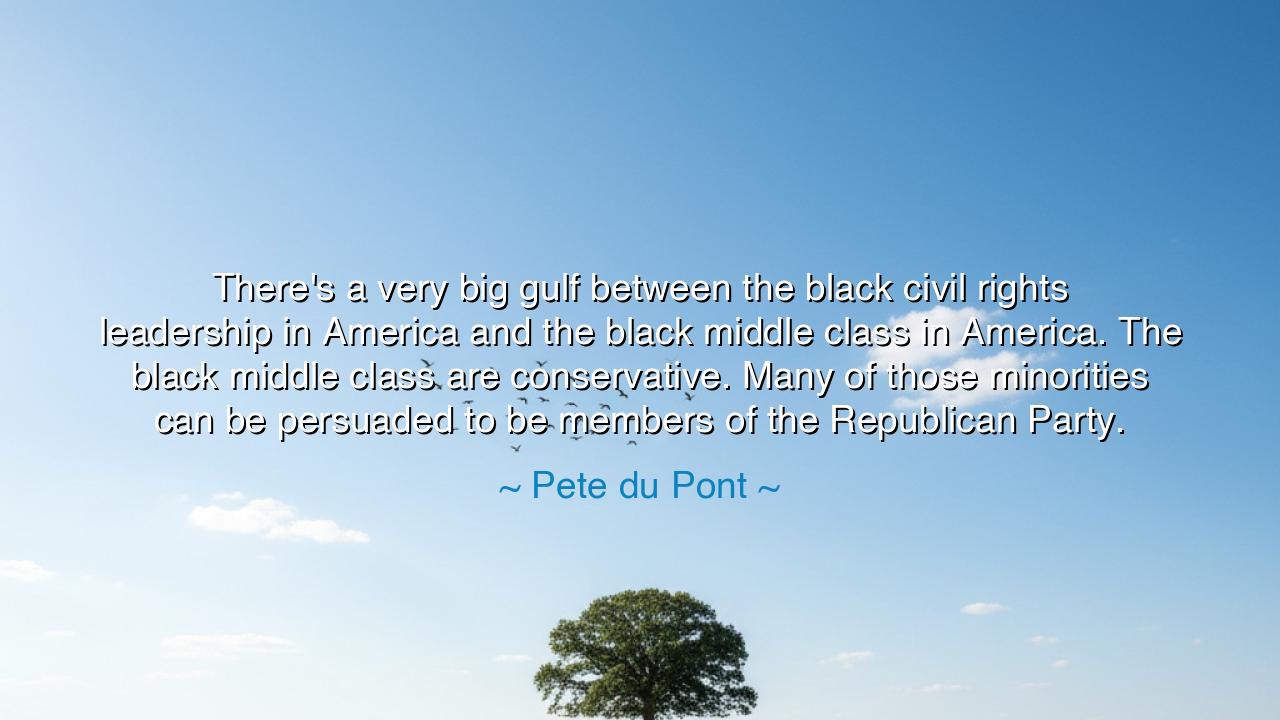
There's a very big gulf between the black civil rights leadership
There's a very big gulf between the black civil rights leadership in America and the black middle class in America. The black middle class are conservative. Many of those minorities can be persuaded to be members of the Republican Party.






The words of Pete du Pont — “There's a very big gulf between the black civil rights leadership in America and the black middle class in America. The black middle class are conservative. Many of those minorities can be persuaded to be members of the Republican Party” — reveal not merely a political observation, but a reflection on the divisions of identity, experience, and aspiration that shape a people. Beneath his words lies a truth that transcends party and era: that the struggle for justice and the pursuit of prosperity do not always move in harmony, and that as one generation fights for freedom, another must learn how to live it. Du Pont, a man of politics and principle, spoke from within the turbulent dialogue of modern America, where race, class, and ideology intertwine like threads of a complex tapestry.
His quote arises from the crossroads of civil rights and social evolution — a recognition that the journey from oppression to opportunity transforms both the individual and the collective. The civil rights leadership, forged in the fires of protest and moral courage, sought liberation through confrontation, through the relentless calling out of injustice and inequality. But the black middle class, born from the victories of that struggle, often turned their attention to preservation — to stability, family, faith, and enterprise. Where one group spoke the language of resistance, the other spoke the language of responsibility. Both were children of the same movement, yet they lived in different seasons of its growth.
This “gulf” that du Pont describes is not a mark of betrayal, but of evolution — the natural tension between past suffering and present success. The civil rights leaders like Dr. Martin Luther King Jr. and Malcolm X fought for the right to climb the mountain; the middle class they helped create began to build homes upon its slopes. Yet as comfort grew, the urgency of revolution softened into conservatism — a desire to protect what had been earned, to anchor in faith and tradition rather than upheaval. In this, du Pont perceives an opportunity — that the moral discipline, entrepreneurial spirit, and community-centered values of the black middle class align in many ways with conservative philosophy: faith in the individual, reverence for family, belief in work and order.
But history reminds us that political persuasion is never simple. For even as new generations rise into affluence, the memory of injustice remains deep in the soul of a people. The scars of slavery, segregation, and discrimination are not easily erased by the comforts of success. Thus, while du Pont’s observation may hold truth in spirit, it also reveals the enduring complexity of identity — how one can be conservative in values, yet progressive in conscience; how a community can celebrate achievement, yet demand equality still. It is a reminder that politics cannot contain the full measure of the human heart.
We can see this reflected in the life of Jackie Robinson, the great baseball pioneer who broke the color barrier. Robinson was a man of discipline, patriotism, and deep faith — virtues often labeled as conservative. Yet he also carried the burning fire of justice, the conviction that the world must change. He supported both Republican and Democratic leaders across his life, not out of shifting allegiance, but from a belief that truth lies not in party, but in principle. His life embodies the very balance du Pont describes — the tension between social loyalty and personal conviction, between gratitude for progress and hunger for perfection.
Du Pont’s insight, then, is not a statement of division, but an invitation to understanding. It calls us to recognize that a people are never monolithic, and that freedom allows for diversity of thought as well as of opportunity. The black middle class that emerged from the civil rights movement did not betray its roots by seeking stability; rather, it fulfilled one of the deepest dreams of that movement — to stand as equals in the halls of success. Yet this independence of thought also brings responsibility: to remember the struggles that paved the way, and to ensure that the ladder remains standing for those still climbing.
The lesson we must take from this quote is both social and spiritual. Every generation inherits both the triumphs and the wounds of those who came before. It must decide how to honor the past without being enslaved by it, how to preserve prosperity without forgetting the poor, how to use freedom not for division, but for dialogue. The true measure of progress is not whether we lean left or right, but whether we walk forward — toward justice, unity, and the shared moral vision that binds all citizens together.
Therefore, let this truth be passed down: every people, once freed, must learn to reconcile its conscience with its comfort. Let leaders listen not only to the cries of the oppressed, but also to the hopes of those who have risen. Let those who have prospered remember the soil from which they grew. For as Pete du Pont reminds us, politics may divide and labels may shift, but the destiny of a nation is fulfilled only when principle transcends party, and when every man and woman — black or white, rich or poor — learns to serve both truth and one another in the spirit of shared humanity.






AAdministratorAdministrator
Welcome, honored guests. Please leave a comment, we will respond soon